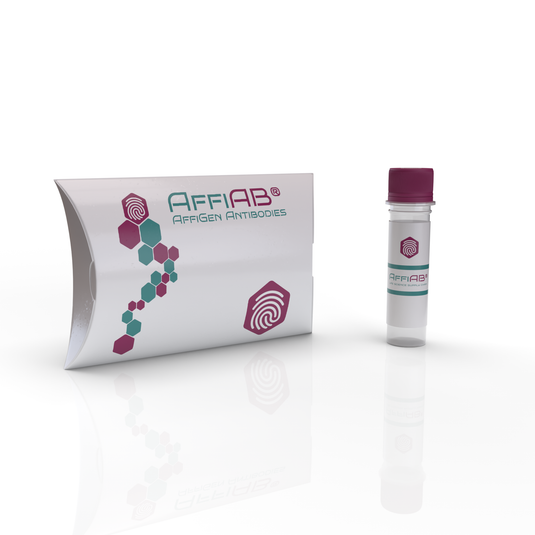AffiAB® Goat Anti-Rab27a Polyclonal IgG Antibody
AffiAB® Goat Anti-Rab27a Polyclonal IgG Antibody is a reliable antibody for the detection and quantification of Rab27a in various samples. This high-quality antibody is made to exacting standards and has been extensively validated in different assay systems. Great for research and diagnostics in immunology, immunotoxicity, and immunopurification.
Host: Goat
Species: Mouse
Description:
The AffiAB® Goat Anti-Rab27a Polyclonal IgG Antibody is an antibody specifically designed to recognize and bind to the Rab27a protein. Rab27a is a member of the Rab family of small GTPases, which play crucial roles in regulating intracellular vesicle trafficking and exocytosis.
This polyclonal antibody is generated by immunizing goats with purified Rab27a protein or a specific peptide sequence derived from Rab27a. The resulting antibodies are then purified from goat serum to ensure high specificity and quality.
The AffiAB® Goat Anti-Rab27a Polyclonal IgG Antibody is commonly used in research applications to study the expression, localization, and function of Rab27a in various biological processes. By detecting and visualizing Rab27a, researchers can gain insights into its involvement in vesicle transport, regulated secretion, and cellular signaling.
Researchers typically employ techniques such as immunoblotting, immunofluorescence, immunohistochemistry, and immunoprecipitation using this antibody. These techniques enable the analysis of Rab27a protein expression, subcellular localization, and interactions with other molecules or cellular components.
It is important to note that the AffiAB® Goat Anti-Rab27a Polyclonal IgG Antibody specifically targets Rab27a and may not cross-react with other Rab proteins or related molecules. Researchers should validate the antibody's performance and specificity in their specific experimental conditions by performing appropriate controls and assays.
In summary, the AffiAB® Goat Anti-Rab27a Polyclonal IgG Antibody is a valuable tool for investigating the expression, localization, and function of Rab27a in various cellular processes. By specifically detecting Rab27a, researchers can gain insights into its roles in vesicle trafficking, exocytosis, and cellular signaling, contributing to our understanding of intracellular mechanisms and cellular physiology.
Gene Identifier/Accession Number: ENSG00000069974
Form: N/A
Concentration: 1 mg/mL
Type: Primary
Clonality: Polyclonal
Isotype: IgG
Conjugation: Unconjugated
Application: Western Blot, Immunofluorescence, Immunohistochemistry PARAFFIN PROTOCOL , Immunohistochemistry FROZEN
Storage: For continuous use, store at 2-8 °C for one-two days. For extended storage, store in -20 °C freezer. Working dilution samples should be discarded if not used within 12 hours.
Special instructions: The antibody solution should be gently mixed before use.
Goat Anti-Rab27a Polyclonal IgG Antibody
In the realm of medical research and diagnostics, the development and application of specific antibodies have revolutionized many aspects of disease detection and biomedical research. Among these, the Goat Anti-Rab27a Polyclonal IgG Antibody stands out as a significant tool, especially in the study of cellular processes and diseases. This article provides an in-depth look at this antibody, its characteristics, applications, and impact on scientific research.
What is Goat Anti-Rab27a Polyclonal IgG Antibody?
The Goat Anti-Rab27a Polyclonal IgG Antibody is a type of polyclonal antibody that is specifically developed to recognize and bind to the Rab27a protein. Rab27a, a member of the Rab family of small GTPases, plays a crucial role in regulating intracellular vesicle trafficking. This protein is particularly significant in processes such as melanosome transport, exosome secretion, and cytotoxic granule release in immune cells.
Produced in goats, this polyclonal antibody is generated by immunizing the animals with a synthetic peptide corresponding to a region of the human Rab27a protein. The immune system of the goats responds to this antigen, producing a mixture of antibodies (IgG) that target various epitopes of the Rab27a protein.
Characteristics and Specificity
The Goat Anti-Rab27a Polyclonal IgG Antibody is known for its high specificity and affinity towards the Rab27a protein. The polyclonal nature of this antibody means that it recognizes multiple epitopes on the target protein, which can enhance the robustness of its binding and detection capabilities.
Applications in Research and Diagnostics
Protein Expression Studies:
This antibody is widely used in Western blotting, immunoprecipitation, and ELISA to detect and quantify Rab27a protein levels in various cell types and tissues.
Immunohistochemistry:
In histological studies, the antibody aids in identifying the presence and localization of Rab27a in tissue sections, providing insights into its role in different physiological and pathological conditions.
Disease Research:
Given Rab27a's involvement in immune cell function and cancer, the Goat Anti-Rab27a Polyclonal IgG Antibody is instrumental in researching diseases like melanoma, autoimmune diseases, and certain hematological cancers.
Cell Biology Studies:
This antibody is crucial in studying vesicular transport mechanisms and cellular secretion pathways, particularly in melanocytes and immune cells.
Quality Control and Storage
The antibody is typically supplied as a liquid in a stabilizing buffer. Quality control measures include testing for specificity, purity, and concentration to ensure reliable performance in various assays. For storage, the antibody is usually kept refrigerated or frozen to maintain its stability and activity over time.
Safety and Handling
As with all biological reagents, safe handling practices are essential.
This includes wearing appropriate protective gear and following laboratory safety protocols. The antibody should be treated as potentially infectious, as it is derived from animal serum.
Conclusion
The Goat Anti-Rab27a Polyclonal IgG Antibody is a powerful tool in the arsenal of modern biomedical research. Its ability to specifically target the Rab27a protein has made it indispensable in the study of vesicular transport and related diseases. As research continues, the applications and significance of this antibody are likely to expand, offering deeper insights into cellular mechanisms and potential therapeutic targets.

